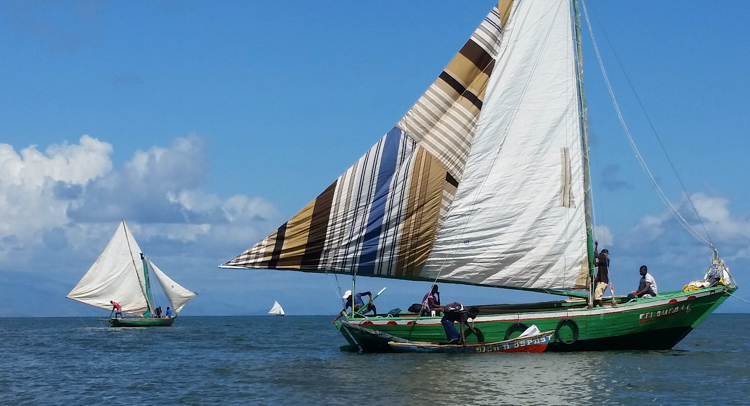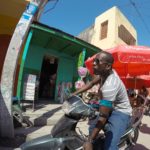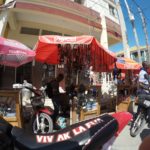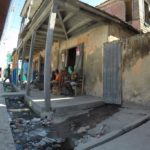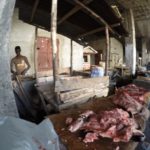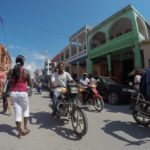
 Despite their apparent poverty, the Haitians have little trouble imbibing during the local Valentine’s Day celebration that we have the privilege of attending. A local entrepreneur has turned one half of his house into a bar by purchasing dozens of cases of Haiti’s most popular beer, Prestige, and continues shuffling them into a chest freezer that dominates his living room in an attempt to keep up with the demand for cold beer.
Despite their apparent poverty, the Haitians have little trouble imbibing during the local Valentine’s Day celebration that we have the privilege of attending. A local entrepreneur has turned one half of his house into a bar by purchasing dozens of cases of Haiti’s most popular beer, Prestige, and continues shuffling them into a chest freezer that dominates his living room in an attempt to keep up with the demand for cold beer.
A laborious hand-tally of each tab is kept by a dutiful book-keeper who furiously flips between carbon-copy pages of what appears to be an ancient work-order book. Beers are a dollar a pop, satisfying the indulgences of the five of us and a few for our new friends for something like $35—making this our cheapest night out EVER. 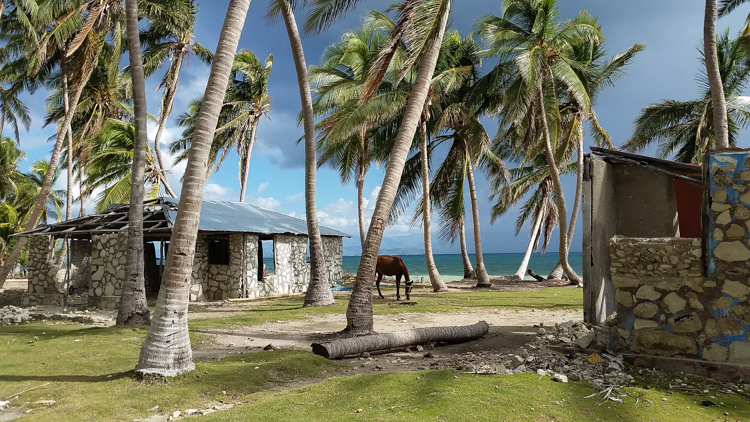 The local kids tug at our arms, “Fon fon?” hoping for a chance to play with a touchscreen. They make quick work of taking candid photos and showing off Facebook pages. A generator runs in the background to power an impressive array of speakers that the DJ keeps thumping throughout the entire night. Why is it that those who have the least party the best? Having only just completed a 48-hour passage that afternoon we are in no position to keep up with the beat, but at least we have no trouble sleeping through the remaining racket.
The local kids tug at our arms, “Fon fon?” hoping for a chance to play with a touchscreen. They make quick work of taking candid photos and showing off Facebook pages. A generator runs in the background to power an impressive array of speakers that the DJ keeps thumping throughout the entire night. Why is it that those who have the least party the best? Having only just completed a 48-hour passage that afternoon we are in no position to keep up with the beat, but at least we have no trouble sleeping through the remaining racket.
Although tourism is a marginal sector of Haiti’s economy, plans are already in motion to capitalize on it’s potential. The place where we stay, Ile A Vache, is currently undergoing the construction of an airport even though the island itself lacks a functioning electrical or plumbing grid. Locals carry jugs to the nearest well for their daily water. Solar panels can be seen perched atop palm-thatched roofs, storing a handful of amp-hours in ancient car batteries that are wired together with scavenged barb-wire. The only “restaurant” in the village is provided by an enterprising family who embellish a table and six chairs in their front yard with a makeshift mosquito net and serve every meal via the romance of candlelight…because their is no other option.
We accompany a couple of boat-boys on their 6 km walk to the island’s “town” on one of it’s two weekly market days. The countryside is lush and dramatic. The “roads” are nothing more than well-trodden paths through the mud or across the sand. Kids in uniform are trekking to school; two woman carry a pig strung-up on a stick; a family on a motorcycle weaves through the traffic; cows are swatted out of the way; a line of men keep rhythm while heaving a great fishing net from the sea by way of some unintelligible chant.
Nearly everything visible is handmade and basic, most of it involving a plethora of scavenged materials. Hardy wooden boats ply the nearby fishing grounds under patch-work sails (or oars, if the wind is lacking), and hordes of dugout mango-tree canoes skit across the waters in every direction. It feels like a scene from Mad Max, or is it the Garden of Eden? I suppose it depends on your mood.
By way of comparison, we do visit the city of Les Cayes on mainland Haiti for a day trip, and the contrast is marked. The hustle and bustle of urban life is as teeming and hectic here as anywhere, but probably far dirtier. Mangy dogs roam the roads which are in shambles; scrappy pigs root through impenetrable trash piles strewn everywhere; and everyone walks in hurried strides of determination, with eyes the cold and distant glassiness required of a rough-and-tumble environment—no smiles or inviting-giggles here.
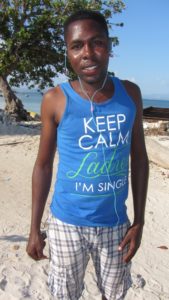 Antwan, a boat-boy from the harbor, is our hired guide for the day. After successfully wrangling our group of five Nordic tourists to the shore (three of us literally are Norwegian but we are all unquestionably white) he leads us through all types of traffic—four-wheeled, four-legged, one wheeled, three-legged, you name it—on our way to the requested bank.
Antwan, a boat-boy from the harbor, is our hired guide for the day. After successfully wrangling our group of five Nordic tourists to the shore (three of us literally are Norwegian but we are all unquestionably white) he leads us through all types of traffic—four-wheeled, four-legged, one wheeled, three-legged, you name it—on our way to the requested bank.  Clare gushes over the sight of a fitted-out UN truck driving by, while we take turns quickly withdrawing cash from an ATM protected by hired guards with machine guns. Next we stroll through some open-air markets on our way to the internet cafe where everyone gets a chance to touch base with the outside world. We visit a hospital along the way, stop for coffee, and buy a few groceries before pausing for a late lunch at a local fast food joint where we chat up some local students over chicken and rice. Antwan is helpful and accommodating all day, but seems unmistakably nervous the entire time.
Clare gushes over the sight of a fitted-out UN truck driving by, while we take turns quickly withdrawing cash from an ATM protected by hired guards with machine guns. Next we stroll through some open-air markets on our way to the internet cafe where everyone gets a chance to touch base with the outside world. We visit a hospital along the way, stop for coffee, and buy a few groceries before pausing for a late lunch at a local fast food joint where we chat up some local students over chicken and rice. Antwan is helpful and accommodating all day, but seems unmistakably nervous the entire time.
We get back to the “ferry terminal” with time enough to down a couple beers at the local “bar” before an overworked Panga arrives to take the next load of people and supplies back across the bay to the island of Ile a Vache. There is some discrepancy over the price of our toll, and Antwan winds up in a lively shouting match that soon involves a range of characters, all of whom look as if they could be cast as Haitian hitmen. We dutifully play our role as dumb white tourists and offer the only thing we have in abundance…money. The issue is resolved, the boat is packed, and we get underway. “You no want to be here after sun go down,” Antwan states matter of factly on our way home, and now we have less reason then ever to doubt him.

Small and easily-fixed as the problem was, ashamedly, it’s just the type of gritty unexpected experience you hope for as someone visiting a foreign land. That thrilling rush of the strange and unknown but in a dose that still feels manageable and safe. At it’s worst, tourism is an admission fee to see what’s behind the curtain. At it’s best, tourism is an opportunity to experience reality in a new way. In one instance you leave with only pictures, in the other you leave with an altered perspective.
I’d be a fool if I didn’t acknowledge the consumption inherent in tourism, but I’ll be damned to count any experience that broadens my mind as a waste. In one way or another we are all “walking hypocrites,” as CJ likes to say, and although it saddens me to imagine these people depending on my money for their well-being, I’m grateful for fresh experiences in different cultures…all the more so when new friends are gleaned along the way.
From all the grateful tourists, here’s to spending well!

